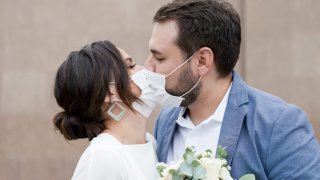
Just in time for the start of wedding season, New York Gov. Andrew Cuomo announced weddings can resume in the state in March at 50% capacity or a maximum of 150 people. All attendees should be tested beforehand, and gatherings will need to get clearance from the health department, he said.
Many other states and cities are once again allowing large gatherings indoors. New Jersey Gov. Phil Murphy said that indoor events like weddings and funerals, and indoor performance venues can reopen at 35% capacity or with a 150-person limit effective Friday. And in Connecticut, houses of worship can reopen at 50% capacity as of Monday.
Prediction models suggest that, as more people in the country get vaccinated, infection rates will come down by the spring or summer, Dr. Jennifer Lighter, infectious disease specialist and epidemiologist at NYU Langone tells CNBC Make It. "But we don't know for sure if it's going to be late March, or late April or when that time period is because there are a lot of unknowns with the variants," she says.
So although large weddings are getting the green light, attending any gathering during the pandemic comes with risks. Here's what experts want you to know:
The more guests, the riskier the gathering
Spending time with anyone outside of your household increases your risk of Covid transmission and infection. Even medium-sized gatherings where people are coming from outside the local area and maintaining social distance are considered "higher risk," according to the Centers for Disease Control.
Putting the cap on 150 guests is not necessarily a calculation that's made based on science, Lighter says. (Other states have different maximums for indoor and outdoor gatherings.) The more people you come into contact with at a gathering, and the longer you spend together, the higher your risk of getting infected with or spreading Covid, the CDC says.
Money Report
A recent survey conducted by the wedding website The Knot found that, due to restrictions, approximately half of wedding receptions that took place during the pandemic had 50 people or fewer attending, and nearly a quarter had fewer than 25 guests. But even small gatherings of 10 people can contribute to surges in Covid cases, as was shown around the winter holidays.
Other safety measures are needed
Thirty-six percent of couples said they will require guests to get tested for Covid ahead of their celebration, according to The Knot.
But limiting the number of people present and requiring tests are just two measures that can help stop the spread. A bundle of several safety measures has a broader effect in preventing transmissions than a singular intervention, Lighter says.
Even if the majority of guests are vaccinated, at this stage, we don't know yet if a vaccinated person can transmit Covid without symptoms, or how much of the population needs to get vaccinated to achieve herd immunity. So, it will still be necessary to wear masks, practice hand hygiene and respiratory etiquette and keep social distance at gatherings.
Traveling is risky
Attending weddings often means traveling. The CDC suggests that people delay travel to protect yourself and others from Covid.
Bringing together people from outside of the local area (for example, a town, city, county or community) heightens the risk of Covid transmission, according to the CDC.
So, should you go?
Any gathering while the virus is spreading comes with risks, weddings included. RSVP-ing "no" is certainly common during the pandemic — another survey from The Knot found that nearly half of wedding guests turned down a wedding invitation in 2020.
Provided that masks and other safety measures are in place, some people who have been fully vaccinated may feel more comfortable going to weddings and living their lives again, Lighter says. "As more and more people become vaccinated, they should feel safer as well," she says.
Check out: Travel ups Covid risk — here’s how many people have been traveling during the pandemic anyway
Don't miss: The best credit cards for building credit of 2021






